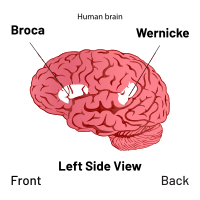
Photo from wikipedia
Abstract Background There are no effective treatments for brain tumor-related fatigue. We studied the feasibility of two novel lifestyle coaching interventions in fatigued brain tumor patients. Methods This phase I/feasibility… Click to show full abstract
Abstract Background There are no effective treatments for brain tumor-related fatigue. We studied the feasibility of two novel lifestyle coaching interventions in fatigued brain tumor patients. Methods This phase I/feasibility multi-center RCT recruited patients with a clinically stable primary brain tumor and significant fatigue (mean Brief Fatigue Inventory [BFI] score ≥ 4/10). Participants were randomized in a 1–1–1 allocation ratio to: Control (usual care); Health Coaching (“HC”, an eight-week program targeting lifestyle behaviors); or HC plus Activation Coaching (“HC + AC”, further targeting self-efficacy). The primary outcome was feasibility of recruitment and retention. Secondary outcomes were intervention acceptability, which was evaluated via qualitative interview, and safety. Exploratory quantitative outcomes were measured at baseline (T0), post-interventions (T1, 10 weeks), and endpoint (T2, 16 weeks). Results n = 46 fatigued brain tumor patients (T0 BFI mean = 6.8/10) were recruited and 34 were retained to endpoint, establishing feasibility. Engagement with interventions was sustained over time. Qualitative interviews (n = 21) suggested that coaching interventions were broadly acceptable, although mediated by participant outlook and prior lifestyle. Coaching led to significant improvements in fatigue (improvement in BFI versus control at T1: HC=2.2 points [95% CI 0.6, 3.8], HC + AC = 1.8 [0.1, 3.4], Cohen’s d [HC] = 1.9; improvement in FACIT-Fatigue: HC = 4.8 points [−3.7, 13.3]; HC + AC = 12 [3.5, 20.5], d [HC and AC] = 0.9). Coaching also improved depressive and mental health outcomes. Modeling suggested a potential limiting effect of higher baseline depressive symptoms. Conclusions Lifestyle coaching interventions are feasible to deliver to fatigued brain tumor patients. They were manageable, acceptable, and safe, with preliminary evidence of benefit on fatigue and mental health outcomes. Larger trials of efficacy are justified.
Journal Title: Neuro-Oncology Practice
Year Published: 2022
Link to full text (if available)
Share on Social Media: Sign Up to like & get
recommendations!